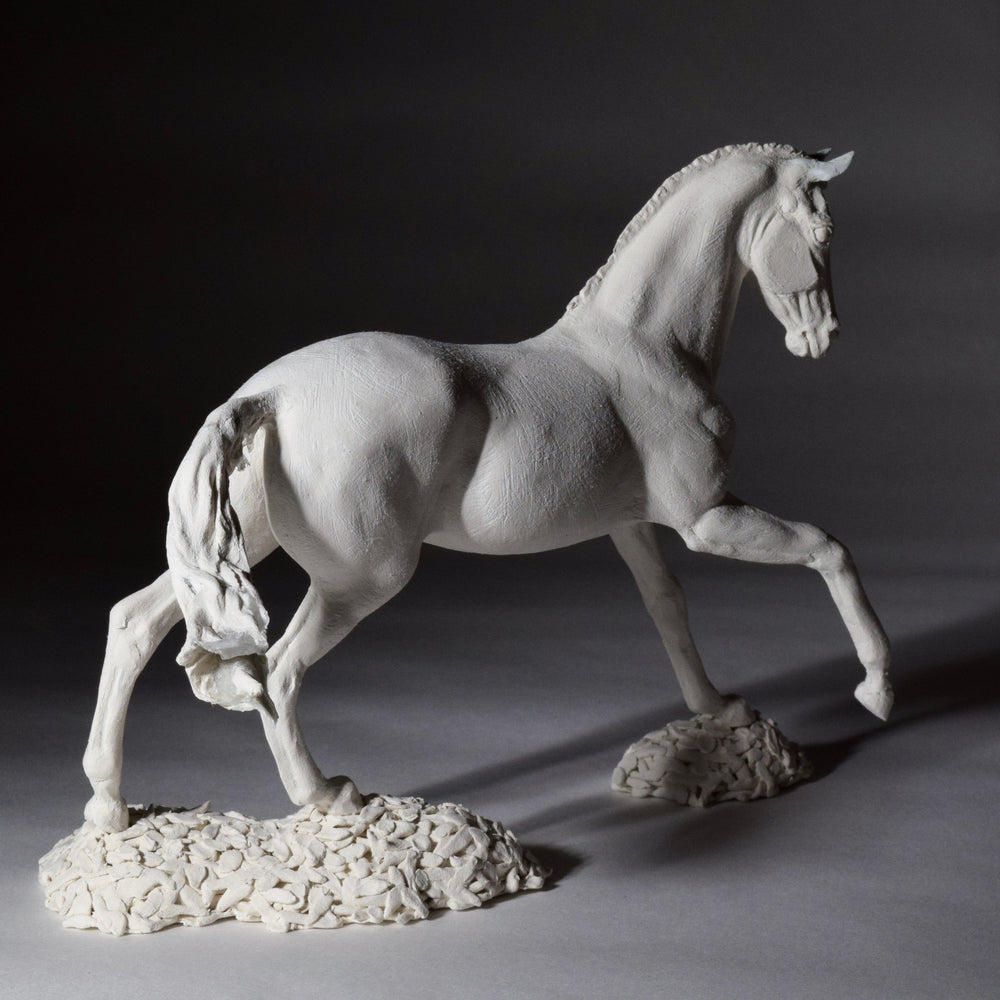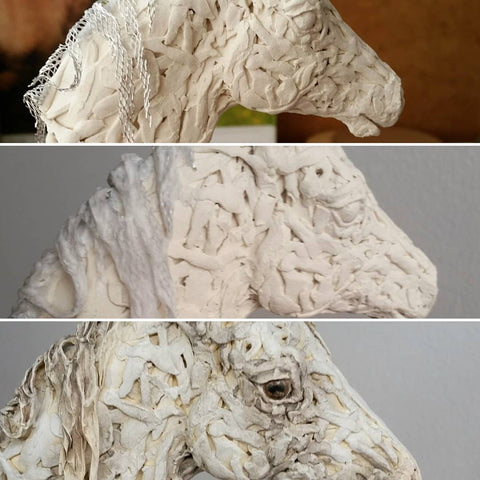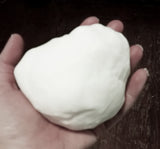
Disclosure: This post may contain affiliate links. I may earn a small commission at no extra cost to you, supporting my blog and content creation. Thank you!
I'll cut right to the chase: there isn't a single "best" air dry clay for sculpting. If only it were that simple! Instead, let's delve into some of the air dry clays that are well-suited for artists and the factors to consider when choosing the right clay for your creative pursuits.
Readers frequently ask me about creating sculptures with "air dry clay" or how "air dry clay" performs under specific conditions. While I strive to offer guidance, it's crucial to understand that "air dry clay" is a broad category with varying characteristics. There are hundreds of types of clay categorieed as "Air dry", and not all of them are equally suitable for use as sculpting mediums.
Things to consider when choosing a clay
Every artist will need something different from a sculpting medium. Some of the more common features to considerations are:
Price 💰
Top of the list for obvious reasons: air dry clays can be pricey.
Access 🏪
This is actually a really big one - if you can't buy the clay, you can't use it. Not all clay brands are sold everywhere. For example, I cannot purchase Apoxie clays* in my area, I have to order it online (which means shipping costs, and suddenly the price is much higher). Instead, I buy Milliput because I can pop into my local art shop while I'm buying other supplies.
Strength 💪
How strong is the clay once dry? I think we all generally prefer sculptures that don't crack or fall apart. This is also often tied to how heavy the clay body is. Air dry clays that specify "natural" or "pottery" are often based on an earthenware type clay and while easy to work with (great for classroom learning), the resulting objects can be heavy and quite fragile as a result.
Texture 🥜
Air dry clays, like ceramic clays, vary in their make up. Some are grainy, some silky smooth.
Ability to hold detail 🐴
This differs from clay to clay and is usually tied to how soft and how smooth it is.
Work-ability 🖐️
Mah fingers! How pliable is the clay to work with? Do you have to condition/mix it before using it? Some artists like firm clays, while others prefer soft.
Stickiness 🍯
Not in texture, but how well does it adhere to things, especially armatures, and itself. This is key when you're trying to build up a sculpture.
Paint-ability 🖌️
Will the clay accept my desired method of decoration?
Longevity 👵
This is one that's not necessarily central in people's minds, but for artists it can be a key consideration. With sculpting materials like bronze and ceramic often the medium of choice, an air dry clay that is archival (or museum-quality) can reassure collectors, and also give you piece of mind that in 20 years the sculpture will not disintegrate.
This is by no means an exhaustive list, but they are characteristics that can determine how successful an air dry clay will be.

And the Winning Clays Are...
There are some that consistently rank on top by artists who use air dry clays as the primary method of their art (such as sculptors and professional doll makers). Considering the list of factors above, these brands rank superior in many of the sections, especially in terms of longevity.
All the clays suggested below are artist-quality (and artist tested). They are arranged in alphabetical order.
Activa La Doll Premier Air-Dry Clay
An air dry clay made from a combination of talc, pumice, and paper pulp. This white clay has a satin smooth surface, and holds fine details very well. Made in the USA.
Pros
Strength: lightweight and very resilient: Sculptures can potentially survive a drop.
Texture: the smoothest. If you need very smooth, this is what you want.
Details: holds detail like nobody's business.
Paint: It's slightly porous surface takes paints easy-peasey.
Cons
Price: Probably the priciest ADC option.
Stickiness: Takes some effort to stick to things and itself.
Fingers: Can be a bit stiff to work with (also the reason it holds details so well), which makes it a bit of a challenge for beginners.
Get your package of Premier Air Dry Clay
Cold Porcelain

Despite its name, cold porcelain isn't actually porcelain, but rather an air-dry clay made from cornstarch and white glue. Numerous recipes can be found online. Cold porcelain is notable for its exceptional durability and toughness; even thin pieces resist snapping and shattering. However, its glue-based composition, rather than being water-based, makes it more challenging to work with.
Pros
Price: Can be be made at home!
Strength: lightweight and very resilient: Sculptures can potentially survive a drop.
Details: holds detail very well, if you can shape it before it starts to dry.
Cons
Texture: generally smooth, but can be difficult to manipulate. Hard to smooth when wet. Very difficult to sand as it dries very hard.
Fingers: while quite soft, it is very difficult to work with as it dries very quickly and can easily become insanely sticky when water is added. Requires some skill to use well.
Stickiness: Has to be made to stick to things by wetting it or using more glue.
Paint: takes paints, but may require extra primer because the clay body is slightly translucent.
Don't want to bother making it? Here are a couple of options for commercial cold porcelain:
Creative Paperclay
A lighweight air dry clay that is soft and easy to work with. Dries to the hardenes of a soft wood and can be sanded, carved and painted once dry. Made in Japan.
Pros
Strength: lightweight and very resilient: Sculptures can potentially survive a drop. More likely to dent than shatter.
Details: holds detail very well.
Stickiness: Sticks easily to everything.
Fingers: Quite soft and easy to work with. Great for beginners.
Paint: It's slightly porous surface takes paints easy-peasey
Cons
Price: Can be expensive and hard to get, depending on where you live.
Texture: has a slight toothy-ness (which some, like myself, really like), but can be sanded smooth. It's softness, which makes it great for beginners, can also make it challenging to work with on thinner sections.
A review of Creative Paperclay
DAS Air Dry Clay
 A smooth textured air dry clay made from clay minerals, water, and natural fibers. Available in white and terra cotta. Made in Italy.
A smooth textured air dry clay made from clay minerals, water, and natural fibers. Available in white and terra cotta. Made in Italy.
Pros
Strength: A bit heavier than CPC when dry and very resilient: Sculptures can potentially survive a drop.
Details: holds detail very well.
Fingers: Moderately soft - between Premier Clay and CPC in firmness.
Paint: It's slightly porous surface takes paints easy-peasey.
Cons
Price: Can be expensive and hard to get, depending on where you live.
Stickiness: Can be difficult to make the clay stick to armature materials and dried clay.
Texture: Very smooth texture, but can become slippery and sticky if too much water is used.
$ A Budget-Friendly Option?

If you're just starting out, Crayola Air Dry Clay is a very affordable way to start playing around and practicing. HOWEVER: it's not as forgiving and does crack a lot more. It is firmer and slightly less durable because it dries a bit brittle.
The issue with very low-end products is that it can impact your overall experience of a whole product category. If possible, try to acquire one of the clays above to see what good quality feels and behaves like. It will make the hobby more fun in the long run.
Air dry polymer clay
Air dry polymer clay is also a medium used by mixed media sculptors, but it has a tendency to droop in humid environments, and is on the expensive side. Polymer clays are a separate class of clay and I do not have enough experience with them to speak confidently on the subject. I mention it here as another alternative.
Some well known brands:
Padico Modena Clay
Hearty Soft Clay
 Air dry clay lets you make incredible things!
Air dry clay lets you make incredible things!
In Conclusion
No matter what clay you choose, the key to successful air dry clay sculptures is to use strong armatures. Like a house - a sculpture won't stand the test of time without a sturdy foundation.
Playing with a few different types of clay will give you the best idea of what works and what doesn't for your artwork. While it's not the most cost effective method, it is hard to replace this type of play: simply reading about a clay will not give you the experience of using it.
So get out there and take matters into your own hands! :)
* Apoxie sculpt is an epoxy clay. To find about more about these types of clays, read my post about Epoxy vs Air Dry Clay.
What's Next?
Create your own sculpture from air dry clay
Learn the secrets of sculpting with Creative Paperclay
Find out how DAS Clay is different from Creative Paperclay




